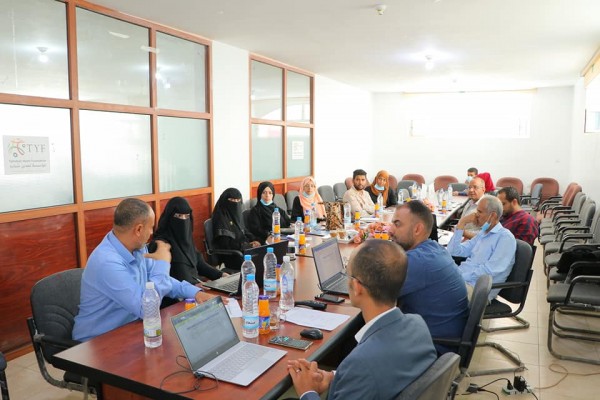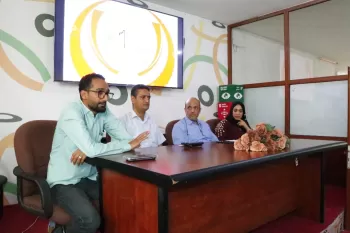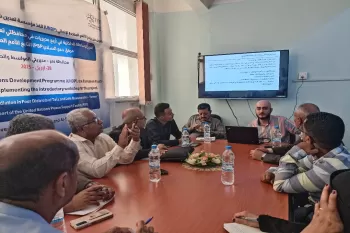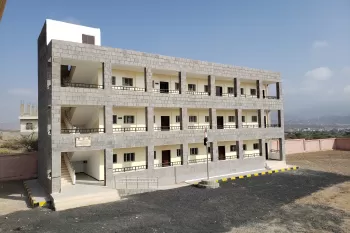Sana’a: Tamdeen Youth Foundation organizes a workshop on “Localization of Humanitarian Action”
On the basis of its Humanitarian Localization Initiative and its tireless efforts to promote peace in Yemen, the Tamdeen Youth Foundation organized, over two consecutive days, a workshop with a group of local actors to review the results of the initiative and discuss the proposed mechanisms and actual and potential challenges. During the workshop held at TYF’s headquarters TYF in Sana'a, in the presence of seven local humanitarian organizations, TYF’s efforts were reviewed in its various meetings with local actors and international decision makers, as well as presenting the initiative and its future vision for its success.
TYF’s Executive Director, Dr. Tammam Al-Hetari, began the workshop by welcoming the attendees, considering that following up on the initiative’s developments and listening to the views of local actors is among the priorities of TYF, since the localization of humanitarian action is primarily a participatory process and concerns all local organizations.
Al-Hettari called on all organizations participating in the workshop to join the Initiative. He noted that the localization of humanitarian action is a right of Yemeni society and that it is primarily the responsibility of CSOs, as they reflect the aspirations of and speak for society, pointing out the importance of establishing mechanisms and standards to regulate the work and steps of this initiative, as well as establishing a joint technical committee. In the same vein, Al-Hettari noted that it is not only available to join the initiative, but also to play a leading role, in accordance with the criteria and mechanisms to be developed and agreed upon by all participants.
localization of humanitarian action is a right of Yemeni society. It was primarily the responsibility of civil society organizations, as it reflected the aspirations of and spoke for society. It was important to establish mechanisms and criteria for organizing the work and steps of the Initiative, as well as to establish a joint technical committee. In the same vein, the door was open to all, not only to join the Initiative but also to play a role.
In turn, TYF’s Chairman, Mr. Hussein Al-Suhaily, reviewed a series of practical steps taken by Tamdeen as part of its initiative to localize humanitarian action and promote peace efforts.
"We have held (15) meetings with local and international organizations and actors, including the EU envoy to Yemen prior to his appointment as UN envoy, as well as the U.S. envoy to Yemen," Al-Suhaily said. "During our meeting with Lenderking, we stressed the importance of CSOs playing an active role in promoting peace efforts. We have also called for the need to separate the political and humanitarian agenda and to implement the triple nexus (humanitarian aid , development and peace)”.
Al-Suhaily pointed out "the meetings sponsored by TYF have varied between personal, official and collective, including meetings of 15 youth organizations, others that included 15 women's organizations and others with many humanitarian organizations, justifying this initiative "because we in CSOs have an active role to play in the field and we must be involved in policy-making and decision-making.
" "There must be a methodology for the localization of humanitarian action," he said, noting that "the process of localization is a long-term process, so TYF has worked to learn from the experiences of other countries on this aspect, to align them with what can be done in Yemen to localize humanitarian action.”
. "We couldn’t have been absent. We are in Yemen and in the most populous areas, at a time when the international community is bringing in representatives living outside the country or choosing representatives of women living abroad, and they don't have efficient knowledge of what's going on inside Yemen. They also don't have a deep understanding of the dynamics of the conflict.”
. "We want a direct partnership with donors committed to localizing humanitarian action, obtaining 25% of the funding, not from or across the UN. He considered that "the international justification for the weak capacity of local organizations to receive substantial funding, or their weak systems to manage such grants, is unacceptable, since building the capacity of local organizations lies primarily with donors.
” Al-Sahuaily noted "the importance of strategic partnership between local and international organizations, which must be translated into long-term projects of up to 10 years,". We must press for the localization of humanitarian action and seek to reach out to donors like the World Bank and others." "There must be a fund to localize humanitarian action at 50% for local organizations," he said, warning at the same time that "there are international organizations that are starting to localize humanitarian action according to their own vision, not international treaties and charters, with a view to circumventing local organizations.
Al-Suhaily, speaking to local organizations participating in the workshop, concluded by saying: "Despite all these challenges, unfortunately, what is happening is that there is competition between us as local organizations," he said: "But we have no choice but to join forces in the face of all these complications."
In turn, Dr. Abdul Karim Qassem, a consultant at TYF, in the field of Localization of Humanitarian Action, reviewed an introduction on the "Charter for Change" and the "Grand Bargain" noting that "the difference between them is that the Grand Bargain was signed by donor States and international bodies, while the Charter for Change emerged from international and local non-governmental organizations," pointing out that " TYF have already signed the Charter for Change," while calling for local organizations to sign it"
" The localization of humanitarian action is very important, but it is a simple part of international standards and obligations covering all aspects of humanity. However, it comes in the second phase in terms of international obligation", noting that "there is a failure to find a mechanism to follow up the implementation of the Charter for Change and the Grand Bargain."
He concluded by reviewing the initiative, while the first output and some activities were amended at the request of the organizations/foundations participating in the workshop.
Participants in the workshop agreed that a network should be formed on the basis of specific and clear criteria, to be defined by all organizations participating in the initiative.
The workshop concluded with the agreement to set up a humanitarian localization team.
In addition, it concluded with a number of recommendations:
Networking with global networks to support the localization of humanitarian action, such as NEAR and ACVA.
Creating a neutral and independent coordination mechanism among humanitarian localization organizations.
Implementing and developing the humanitarian localization indicator.
The initiative should be national, free from any politicization.
Agreement on another meeting to be scheduled later, to discuss new ideas and proposals in favor of the localization of humanitarian action initiative in Yemen.
The workshop, held at the headquarters of TYF in Sana'a, was attended by Soul for Development Organization, Field Medical Foundation, Life Makers Meeting Place Organization, Abs Development Foundation, YDN and Medical Mercy Foundation.
As a part of it initiative to the Localization of Humanitarian Action in Yemen, TYF launched the hashtag below, which calls on all CSOs and activists to interact with the initiative and to circulate the hashtag.
Localization_of_humanitarian_action_in_Yemen




